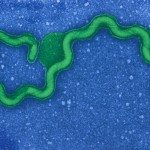Lien vers Pubmed [PMID] – 30643682
PeerJ 2019;6:e6182
subsp. is the causative agent of syphilis, a sexually transmitted disease with worldwide prevalence. Several different molecular typing schemes are currently available for this pathogen. To enable population biology studies of the syphilis agent and for epidemiological surveillance at the global scale, a harmonized typing tool needs to be introduced. Recently, we published a new multi-locus sequence typing (MLST) with the potential to significantly enhance the epidemiological data in several aspects (e.g., distinguishing genetically different clades of syphilis, subtyping inside these clades, and finally, distinguishing different subspecies of non-cultivable pathogenic treponemes). In this short report, we introduce the PubMLST database for treponemal DNA data storage and for assignments of allelic profiles and sequencing types. Moreover, we have summarized epidemiological data of all treponemal strains ( = 358) with available DNA sequences in typing loci and found several association between genetic groups and characteristics of patients. This study proposes the establishment of a single MLST of and encourages researchers and public health communities to use this PubMLST database as a universal tool for molecular typing studies of the syphilis pathogen.

